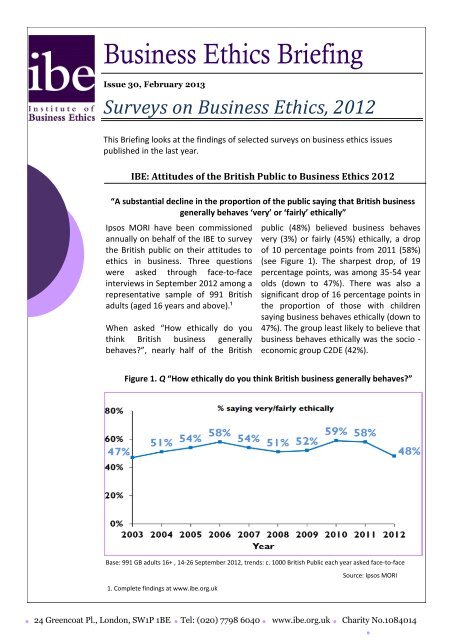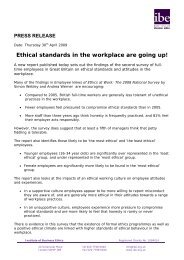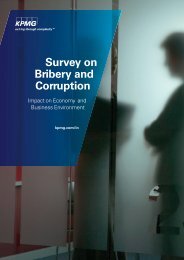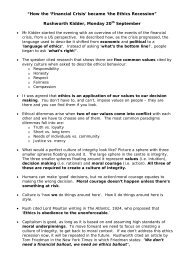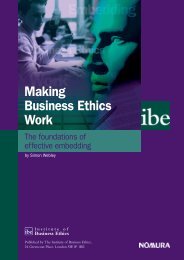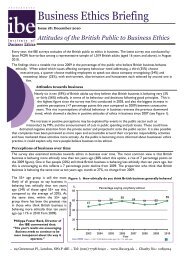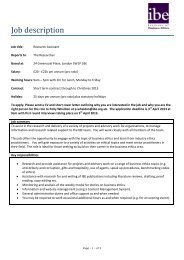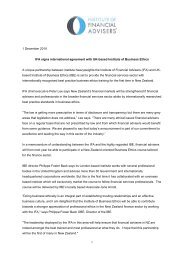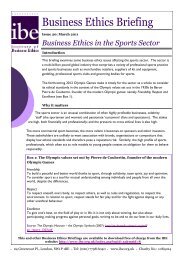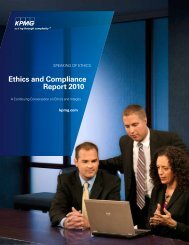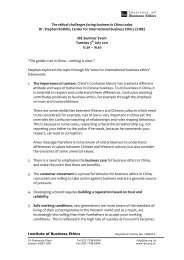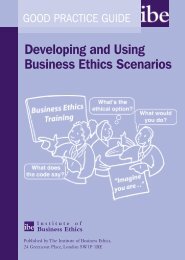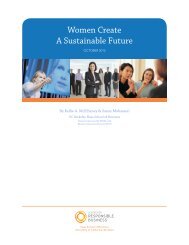Surveys on Business Ethics, 2012 - Institute of Business Ethics
Surveys on Business Ethics, 2012 - Institute of Business Ethics
Surveys on Business Ethics, 2012 - Institute of Business Ethics
Create successful ePaper yourself
Turn your PDF publications into a flip-book with our unique Google optimized e-Paper software.
<strong>Business</strong> <strong>Ethics</strong> Briefing<br />
Issue 30, February 2013<br />
<str<strong>on</strong>g>Surveys</str<strong>on</strong>g> <strong>on</strong> <strong>Business</strong> <strong>Ethics</strong>, <strong>2012</strong><br />
This Briefing looks at the findings <strong>of</strong> selected surveys <strong>on</strong> business ethics issues<br />
published in the last year.<br />
IBE: Attitudes <strong>of</strong> the British Public to <strong>Business</strong> <strong>Ethics</strong> <strong>2012</strong><br />
“A substantial decline in the proporti<strong>on</strong> <strong>of</strong> the public saying that British business<br />
generally behaves ‘very’ or ‘fairly’ ethically”<br />
Ipsos MORI have been commissi<strong>on</strong>ed<br />
annually <strong>on</strong> behalf <strong>of</strong> the IBE to survey<br />
the British public <strong>on</strong> their attitudes to<br />
ethics in business. Three questi<strong>on</strong>s<br />
were asked through face-to-face<br />
interviews in September <strong>2012</strong> am<strong>on</strong>g a<br />
representative sample <strong>of</strong> 991 British<br />
adults (aged 16 years and above).¹<br />
When asked “How ethically do you<br />
think British business generally<br />
behaves?”, nearly half <strong>of</strong> the British<br />
public (48%) believed business behaves<br />
very (3%) or fairly (45%) ethically, a drop<br />
<strong>of</strong> 10 percentage points from 2011 (58%)<br />
(see Figure 1). The sharpest drop, <strong>of</strong> 19<br />
percentage points, was am<strong>on</strong>g 35-54 year<br />
olds (down to 47%). There was also a<br />
significant drop <strong>of</strong> 16 percentage points in<br />
the proporti<strong>on</strong> <strong>of</strong> those with children<br />
saying business behaves ethically (down to<br />
47%). The group least likely to believe that<br />
business behaves ethically was the socio -<br />
ec<strong>on</strong>omic group C2DE (42%).<br />
Figure 1. Q “How ethically do you think British business generally behaves?”<br />
Base: 991 GB adults 16+ , 14-26 September <strong>2012</strong>, trends: c. 1000 British Public each year asked face-to-face<br />
1. Complete findings at www.ibe.org.uk<br />
Source: Ipsos MORI<br />
24 Greencoat Pl., L<strong>on</strong>d<strong>on</strong>, SW1P 1BE Tel: (020) 7798 6040 www.ibe.org.uk Charity No.1084014
Page 2 <str<strong>on</strong>g>Surveys</str<strong>on</strong>g> <strong>on</strong> <strong>Business</strong> <strong>Ethics</strong>, <strong>2012</strong><br />
The IBE survey also examines attitudes towards<br />
ethics in business over time. There remain mixed<br />
views <strong>on</strong> how ethically business behaves<br />
compared with 10 years ago.<br />
A quarter (25%) say business behaves the<br />
same as it did ten years ago (a decline <strong>of</strong> 5<br />
percentage points from the 2011 figure).<br />
Just over a quarter (28%) <strong>of</strong> the public think<br />
British business behaves more ethically now<br />
than 10 years ago (the same proporti<strong>on</strong> as<br />
2011).<br />
The same proporti<strong>on</strong> (28%) in <strong>2012</strong> think<br />
business behaves less ethically now than 10<br />
years ago – similar to the 2011 proporti<strong>on</strong> <strong>of</strong><br />
29%.<br />
The results for subgroups <strong>of</strong> the populati<strong>on</strong> show<br />
that graduates are the group most likely to think<br />
business is behaving more ethically now than ten<br />
years ago (41%). Similar to Q1, those from socioec<strong>on</strong>omic<br />
group C2DE were the least likely to<br />
believe business is behaving more ethically than<br />
ten years ago (19%). Only 21% <strong>of</strong> those aged 55+<br />
believe business is behaving more ethically than<br />
ten years ago, a significantly lower proporti<strong>on</strong><br />
than younger age groups.<br />
When the British public were asked “In your view<br />
<strong>of</strong> company behaviour, which two or three <strong>of</strong><br />
these issues most need addressing?”, ‘Executive<br />
pay’ (34%) and ‘Corporate tax avoidance’ (27%)<br />
came out top (See Figure 2).<br />
‘Executive pay’ was the issue most comm<strong>on</strong>ly<br />
identified, as has been the case since 2008. Those<br />
surveyed were asked about a new issue in <strong>2012</strong> -<br />
‘Corporate tax avoidance’ and just over a quarter<br />
(27%) said that this most needs addressing.<br />
‘Discriminati<strong>on</strong> in treatment <strong>of</strong> people’ came<br />
third (22%) – a similar proporti<strong>on</strong> as in 2011<br />
(21%).<br />
These were closely followed by ‘Bribery and<br />
corrupti<strong>on</strong>’ (20%), ‘Employees being able to<br />
speak out about company wr<strong>on</strong>gdoing’ (20%)<br />
and ‘Fair and open pricing <strong>of</strong> products and<br />
services’ (15%)<br />
Base: 991 GB adults 16+ , 14-26 September <strong>2012</strong>, trends: c. 1000 British Public each year asked face-to-face<br />
Source: Ipsos MORI<br />
24 Greencoat Pl., L<strong>on</strong>d<strong>on</strong>, SW1P 1BE Tel: (020) 7798 6040 www.ibe.org.uk Charity No.1084014
Page 3 <str<strong>on</strong>g>Surveys</str<strong>on</strong>g> <strong>on</strong> <strong>Business</strong> <strong>Ethics</strong>, <strong>2012</strong><br />
A significant drop was seen for ‘Envir<strong>on</strong>mental<br />
resp<strong>on</strong>sibility’ from being the 4 th most<br />
menti<strong>on</strong>ed (20%) in 2011 to equal 7 th in <strong>2012</strong><br />
(down 6 percentage points to 14%), as is the case<br />
for ‘Harassment and bullying in the workplace’<br />
which was down 4 percentage points from 2011<br />
to 14%. ‘Openness with informati<strong>on</strong>’ and<br />
‘Sweatshop labour’ were both down 5<br />
percentage points from 2011 to 13% and 12%<br />
respectively. ‘Advertising and marketing<br />
practices’ came next and was the <strong>on</strong>e area that<br />
was significantly more likely to be menti<strong>on</strong>ed in<br />
<strong>2012</strong> than the year before (11% selected this<br />
issue in <strong>2012</strong>, up five percentage points from 6%<br />
in 2011). ‘Human rights’ saw little change at a<br />
drop <strong>of</strong> <strong>on</strong>e percentage point to 11% but ‘Workhome<br />
balance for employees’ dropped by 7<br />
percentage points to 10%, and ‘Safety and<br />
security in the workplace’ was down by 5<br />
percentage points to 9%. Finally, ‘Treatment <strong>of</strong><br />
suppliers’ remained at a similar level to 2011,<br />
selected by 6%.<br />
Edelman: Trust Barometer, 2013<br />
“Trust in business increases globally”<br />
There were some significant differences between<br />
subgroups <strong>of</strong> the populati<strong>on</strong>.<br />
As in 2011, women (18%) were significantly<br />
more likely than men (11%) to say ‘Harassment<br />
and bullying’ in the workplace was an issue<br />
that needed addressing.<br />
Graduates (37%) were significantly more likely<br />
than the total sample (27%) to select<br />
‘Corporate tax avoidance’, ‘Envir<strong>on</strong>mental<br />
resp<strong>on</strong>sibility’ (25% compared to 14% <strong>of</strong> the<br />
total sample) and ‘Work/home balance’ (17%<br />
compared to 10% <strong>of</strong> the total sample) as issues<br />
that needed addressing.<br />
Men (17%) were significantly less likely than<br />
the total sample (20%) to say being able to<br />
‘Speak out about wr<strong>on</strong>gdoing’ needs<br />
addressing.<br />
Full summary available: http://bit.ly/ZAnQ3L<br />
At the end <strong>of</strong> <strong>2012</strong>, the 13th annual Edelman<br />
Trust Barometer surveyed more than 31,000<br />
resp<strong>on</strong>dents in 26 markets around the world and<br />
measured their trust in instituti<strong>on</strong>s, industries<br />
and leaders. This <strong>on</strong>line survey included 1,000<br />
members <strong>of</strong> the general populati<strong>on</strong> in each<br />
market and a number <strong>of</strong> members <strong>of</strong> the<br />
informed public 2 (500 in US & China and 200 in all<br />
other countries).<br />
Overall, trust in business has increased 5<br />
percentage points since the <strong>2012</strong> survey with<br />
more than half (58%) <strong>of</strong> resp<strong>on</strong>dents globally<br />
saying they would trust business “to do what is<br />
right” and 17% trusting business “a great<br />
deal” (up from 14% in <strong>2012</strong>).<br />
<strong>Business</strong> leaders however, saw a minimal<br />
increase in trust levels as globally <strong>on</strong>ly 43% <strong>of</strong> the<br />
informed public trust CEOs as credible spokes-<br />
people. In the UK the figure was even lower at<br />
<strong>on</strong>ly 39%. Globally, <strong>on</strong>ly 18% <strong>of</strong> the general<br />
populati<strong>on</strong> trust business leaders to “tell the<br />
truth” and 19% say they trust them to “make<br />
ethical and moral decisi<strong>on</strong>s”.<br />
For the seventh year, technology (77%) and, for<br />
the fourth year, automotive (69%) remain the<br />
most trusted industries. Of the 11 industries<br />
included in the survey, banking (50%) and<br />
financial services (50%), c<strong>on</strong>tinued to bring up the<br />
rear.<br />
In 2013 the Barometer looked for the first time at<br />
the differences in trust in big business and small<br />
business to do what’s right. Significant differences<br />
in percepti<strong>on</strong>s <strong>of</strong> the two were noted. Globally,<br />
informed publics trusted big business more than<br />
small business (70% vs. 62%). An inverse<br />
relati<strong>on</strong>ship <strong>of</strong> trust exists between developed<br />
2 “Informed publics” met the following criteria: college-educated; household income in the top quartile for their age in their country;<br />
read or watch business news/ media at least several times a week; follow public policy issues in the news at least several times a week.<br />
24 Greencoat Pl., L<strong>on</strong>d<strong>on</strong>, SW1P 1BE Tel: (020) 7798 6040 www.ibe.org.uk Charity No.1084014
Page 4 <str<strong>on</strong>g>Surveys</str<strong>on</strong>g> <strong>on</strong> <strong>Business</strong> <strong>Ethics</strong>, <strong>2012</strong><br />
and emerging markets as developed countries<br />
place greater trust in small business over big<br />
business (76% vs. 53%).<br />
The survey identified 16 specific attributes which<br />
build trust and grouped these into five<br />
performance clusters. Of most importance to the<br />
public when deciding whether or not to trust a<br />
company was engagement (59%), closely<br />
followed by integrity (58%) and products and<br />
services (54%). Purpose and operati<strong>on</strong>s were <strong>of</strong><br />
least importance with 47% and 39% respectively<br />
<strong>of</strong> the sample c<strong>on</strong>sidering them important when<br />
it came to trusting a business. In reality however,<br />
business is failing to meet these expectati<strong>on</strong>s and<br />
a gap between expectati<strong>on</strong>s and business<br />
practice was found for all 16 activities.<br />
Full report available at: http://bit.ly/11K3t8o<br />
Ernst & Young 12 th Global Fraud Survey: Growing Bey<strong>on</strong>d - a place for integrity, <strong>2012</strong><br />
“24% <strong>of</strong> resp<strong>on</strong>dents said bribery/corrupt practices have increased because <strong>of</strong> the ec<strong>on</strong>omic<br />
downturn”<br />
More than 1,700 interviews with chief financial<br />
<strong>of</strong>ficers and heads <strong>of</strong> legal, compliance and<br />
internal audit were carried out to obtain their<br />
views <strong>on</strong> fraud, bribery and corrupti<strong>on</strong> risk and<br />
establish how their organisati<strong>on</strong>s are working to<br />
mitigate them. These were c<strong>on</strong>ducted in 43<br />
countries between November 2011 and February<br />
<strong>2012</strong> and the results highlighted important issues<br />
for boards <strong>of</strong> directors.<br />
The survey found that bribery and corrupti<strong>on</strong> are<br />
widespread, with 39% <strong>of</strong> resp<strong>on</strong>dents reporting<br />
that bribery or corrupt practices occur frequently<br />
in their countries. Compared to Ernst and Young’s<br />
11 th Global Fraud Survey (2011), resp<strong>on</strong>dents<br />
were increasingly willing to make cash payments<br />
to win or retain business (15% versus 9% in 2011)<br />
and 5% <strong>of</strong> resp<strong>on</strong>dents would c<strong>on</strong>sider misstating<br />
financial performance, versus 3% in the 2011<br />
survey. Nearly a third (30%) were willing to use<br />
entertainment to win or retain business and a<br />
generally weak c<strong>on</strong>trol envir<strong>on</strong>ment was revealed<br />
with nearly a quarter (24%) resp<strong>on</strong>ding that there<br />
were no clear penalties for breaking company<br />
anti-bribery and corrupti<strong>on</strong> (ABC) policies.<br />
There is a visible lack <strong>of</strong> training with less than<br />
half (46%) <strong>of</strong> CFOs and <strong>on</strong>ly 42% <strong>of</strong> total<br />
resp<strong>on</strong>dents having attended ABC training. While<br />
46% <strong>of</strong> total resp<strong>on</strong>dents agree that company<br />
management are likely to cut corners to meet<br />
targets, CFOs have an even more pessimistic view<br />
(52%). Using third parties in new markets was<br />
identified as a key risk, yet 44% <strong>of</strong> resp<strong>on</strong>dents<br />
reported that background checks were not being<br />
performed in this area.<br />
Full report available at: http://bit.ly/LdsBHU<br />
The Network 3 : <strong>2012</strong> Corporate Governance and Compliance Hotline Benchmarking<br />
Report: Industry Report<br />
“After a two-year decline, incident reporting rates are <strong>on</strong> the increase”<br />
This survey looks at how comprehensive<br />
governance, risk and compliance (GRC)<br />
programmes are impacting corporate behaviour.<br />
It is a statistical study <strong>of</strong> 599,162 compliance<br />
incidents reported to The Network’s hotlines<br />
throughout the five-year period covering 2007 to<br />
2011. In 2011, 129,199 incident reports were<br />
taken from 1,128 organisati<strong>on</strong>s representing<br />
15,052,215 employees. The incident reports had<br />
been received from a wide variety <strong>of</strong> people<br />
associated with each organisati<strong>on</strong> including<br />
employees, ex-employees, vendors, shareholders<br />
3. “The Network” provide integrated governance, risk and compliance (GRC) s<strong>of</strong>tware soluti<strong>on</strong>s including an an<strong>on</strong>ymous reporting hotline<br />
to companies around the globe.<br />
24 Greencoat Pl., L<strong>on</strong>d<strong>on</strong>, SW1P 1BE Tel: (020) 7798 6040 www.ibe.org.uk Charity No.1084014
Page 5 <str<strong>on</strong>g>Surveys</str<strong>on</strong>g> <strong>on</strong> <strong>Business</strong> <strong>Ethics</strong>, <strong>2012</strong><br />
and the public. The majority <strong>of</strong> incident reports<br />
originated in North America, with a substantial<br />
number <strong>of</strong> reports originating from an<br />
“Unknown” locati<strong>on</strong>.<br />
While there was a steady increase in 2007 and<br />
2008 in overall incident reports, that rate fell in<br />
2009 and 2010 to a five-year low <strong>of</strong> 8.1 per 1,000<br />
employees. In 2011, the incident rate rose to 8.6,<br />
most significantly in organisati<strong>on</strong>s with between<br />
20,011 - 50,000 employees. On average over the<br />
past five years, organisati<strong>on</strong>s with fewer than<br />
5,000 employees experienced the highest number<br />
<strong>of</strong> reported incidents.<br />
Although ph<strong>on</strong>e-based reporting is the most<br />
popular method for incident capture (85%), the<br />
popularity <strong>of</strong> reporting via the web grew from<br />
10.3% in 2010 to 13.9% in 2011. Only around 1%<br />
<strong>of</strong> reports made in 2011 came in through<br />
alternative methods such as email or fax.<br />
Over the past five years, there have been small<br />
fluctuati<strong>on</strong>s in whether or not participants<br />
notified management <strong>of</strong> their c<strong>on</strong>cerns prior to<br />
making their hotline report. C<strong>on</strong>sistently, since<br />
2007, 70 – 73% <strong>of</strong> incidences have not been<br />
reported to a manager first, indicating a<br />
preference am<strong>on</strong>g the majority <strong>of</strong> employees to<br />
use a reporting mechanism other than a face-t<strong>of</strong>ace<br />
c<strong>on</strong>versati<strong>on</strong> with management. In 2009 and<br />
2010 across all industry categories, participants<br />
are equally divided in choosing to reveal or not<br />
reveal their identity when submitting an incident.<br />
In 2011 however, the scales tipped to 52% <strong>of</strong><br />
participants choosing to reveal their identity.<br />
In 2011, the distributi<strong>on</strong> <strong>of</strong> case outcome results<br />
was nearly identical to the 2010 results, with 67%<br />
<strong>of</strong> all reports warranting an investigati<strong>on</strong> and <strong>on</strong>ly<br />
16% not doing so. Of the 67%, 41% resulted in a<br />
corrective acti<strong>on</strong> being taken.<br />
Read the full report at: http://bit.ly/14v8qRk<br />
Dow J<strong>on</strong>es: State <strong>of</strong> Anti-Corrupti<strong>on</strong> Compliance Survey, <strong>2012</strong><br />
“Corrupti<strong>on</strong> c<strong>on</strong>cerns are increasingly impacting companies’ decisi<strong>on</strong>s about forming or expanding<br />
business partner relati<strong>on</strong>ships and c<strong>on</strong>ducting business in emerging markets”<br />
This survey interviewed more than 300<br />
compliance pr<strong>of</strong>essi<strong>on</strong>als at companies across key<br />
industries worldwide. It revealed an increase from<br />
2011 in the percentage <strong>of</strong> companies that have<br />
stopped or delayed business endeavours with<br />
partners (60% <strong>of</strong> resp<strong>on</strong>dents) and entrance or<br />
expansi<strong>on</strong> in emerging markets (48% and 47%<br />
respectively) due to c<strong>on</strong>cerns about violating anticorrupti<strong>on</strong><br />
regulati<strong>on</strong>s. Entrance to emerging<br />
markets was most impacted, with slowdowns in<br />
business activities increasing by nearly 10<br />
percentage points over 2011.<br />
A rise in the use <strong>of</strong> anti-corrupti<strong>on</strong> programmes<br />
was shown with 83% <strong>of</strong> companies stating that<br />
they had a programme in place versus 74% in<br />
2011. Western Europe saw the largest increase in<br />
the implementati<strong>on</strong> <strong>of</strong> anti-corrupti<strong>on</strong><br />
programmes over the past two years while North<br />
America and Asia-Pacific regi<strong>on</strong>s trailed behind.<br />
The survey showed that due diligence is<br />
increasingly focused <strong>on</strong> uncovering government<br />
c<strong>on</strong>necti<strong>on</strong>s within potential business partners,<br />
with nearly two-thirds <strong>of</strong> resp<strong>on</strong>dents including<br />
this check in their preliminary due diligence, an<br />
increase <strong>of</strong> 9 percentage points from 2011.<br />
However, despite its growing importance,<br />
companies are still struggling with due diligence<br />
in a more heavily regulated envir<strong>on</strong>ment and as a<br />
result, <strong>on</strong>ly half feel very c<strong>on</strong>fident in their<br />
programmes. The majority <strong>of</strong> companies (43%)<br />
<strong>on</strong>ly update their due diligence programmes <strong>on</strong><br />
an event-driven basis, such as when new<br />
reputati<strong>on</strong> issues or government sancti<strong>on</strong>s arise,<br />
while about 40% <strong>of</strong> companies update their due<br />
diligence at least every two years.<br />
A high percentage (44%) <strong>of</strong> compliance<br />
pr<strong>of</strong>essi<strong>on</strong>als suspected that their company had<br />
lost c<strong>on</strong>tracts to unethical competitors.<br />
Full report available at: http://bit.ly/Kax8tg<br />
24 Greencoat Pl., L<strong>on</strong>d<strong>on</strong>, SW1P 1BE Tel: (020) 7798 6040 www.ibe.org.uk Charity No.1084014
Page 6 <str<strong>on</strong>g>Surveys</str<strong>on</strong>g> <strong>on</strong> <strong>Business</strong> <strong>Ethics</strong>, <strong>2012</strong><br />
Associati<strong>on</strong> <strong>of</strong> British Insurers Report <strong>on</strong> Board Effectiveness: Updating progress,<br />
promoting best practice, <strong>2012</strong><br />
“The number <strong>of</strong> women being appointed to boards is increasing”.<br />
A survey <strong>of</strong> FTSE 350 company secretaries was<br />
c<strong>on</strong>ducted by the ABI to provide an update <strong>on</strong> the<br />
current state <strong>of</strong> reporting and best practice in<br />
three key areas <strong>of</strong> improving board effectiveness:<br />
board diversity, successi<strong>on</strong> planning and board<br />
evaluati<strong>on</strong>.<br />
The survey showed the number <strong>of</strong> women being<br />
appointed to boards has increased over the last<br />
year. In <strong>2012</strong> over 26% <strong>of</strong> FTSE 100 and over 30%<br />
<strong>of</strong> FTSE 250 board appointments were women<br />
compared with 19% and 12% respectively in the<br />
2011 report. C<strong>on</strong>sequently over 17% <strong>of</strong> FTSE 100<br />
and nearly 12% <strong>of</strong> FTSE 250 board members are<br />
women, compared with 14% and 8% respectively<br />
in 2011. However, the number <strong>of</strong> women in<br />
executive director positi<strong>on</strong>s remains low: less<br />
than 7% <strong>of</strong> FTSE 100 and less than 5% <strong>of</strong> FTSE 250.<br />
The level <strong>of</strong> disclosure <strong>on</strong> gender diversity is<br />
improving as almost 64% FTSE 100 and over 38%<br />
<strong>of</strong> FTSE 250 companies provided a material<br />
statement in their annual report. This compares<br />
with 19% and 7%, respectively, in 2011’s report.<br />
Full report available: http://bit.ly/11AQxC0<br />
Proskauer Rose LLP: Social Media in the Workplace Around the World 2.0, <strong>2012</strong><br />
“Only about <strong>on</strong>e-third <strong>of</strong> employers currently provide training <strong>on</strong> appropriate use <strong>of</strong> social media.”<br />
Over the past two years, Proskauer Rose LLP and<br />
their global partners have collected nearly 250<br />
resp<strong>on</strong>ses from multinati<strong>on</strong>al businesses detailing<br />
their social media policies and practices. Their<br />
research shows that compared to 2011 employers<br />
now have more positive attitudes towards social<br />
media, particularly for n<strong>on</strong>-business use. This<br />
year, more than 40% <strong>of</strong> employers c<strong>on</strong>sidered it<br />
an advantage to allow employees to use social<br />
media for both business and n<strong>on</strong>-business use.<br />
Last year, the figure was less than a third (30%).<br />
The number <strong>of</strong> employers that allow all<br />
employees access to social media sites at work for<br />
n<strong>on</strong>-business use remains at around half, and<br />
about <strong>on</strong>e-quarter <strong>of</strong> businesses allow some<br />
employees access to social media sites at work for<br />
n<strong>on</strong>-business use.<br />
There has been an increase in the number <strong>of</strong><br />
employers that m<strong>on</strong>itor usage <strong>of</strong> social media<br />
sites, from 27% to 36%, and the number <strong>of</strong><br />
employers that have dedicated social media<br />
policies has increased from 55% to 69%. Similar to<br />
2011 almost half <strong>of</strong> all employers have had to deal<br />
with misuse <strong>of</strong> social media by employees (or<br />
former employees).<br />
Despite this, <strong>on</strong>ly about <strong>on</strong>e-third <strong>of</strong> employers<br />
currently provide training <strong>on</strong> appropriate use <strong>of</strong><br />
social media.<br />
Just over <strong>on</strong>e-quarter <strong>of</strong> employers block<br />
employee access to social media and about <strong>on</strong>ethird<br />
<strong>of</strong> businesses have had to take disciplinary<br />
acti<strong>on</strong> against an employee for misuse <strong>of</strong> social<br />
media.<br />
Full report available at: http://bit.ly/SXn78Q<br />
24 Greencoat Pl., L<strong>on</strong>d<strong>on</strong>, SW1P 1BE Tel: (020) 7798 6040 www.ibe.org.uk Charity No.1084014
Page 7 <str<strong>on</strong>g>Surveys</str<strong>on</strong>g> <strong>on</strong> <strong>Business</strong> <strong>Ethics</strong>, <strong>2012</strong><br />
Other <str<strong>on</strong>g>Surveys</str<strong>on</strong>g> <strong>of</strong> Interest<br />
University <strong>of</strong> Greenwich: UK Attitudes to Whistleblowing, <strong>2012</strong><br />
The research, c<strong>on</strong>ducted in October <strong>2012</strong> using a<br />
random sample <strong>of</strong> 2,000 British adults aged 18+,<br />
shows 4 out <strong>of</strong> 5 Brit<strong>on</strong>s think that people should<br />
be supported for revealing serious wr<strong>on</strong>gdoing,<br />
even if it means revealing inside informati<strong>on</strong>.<br />
However, under half <strong>of</strong> the resp<strong>on</strong>dents (47%)<br />
thought whistleblowing is an acceptable thing to<br />
do in our society.<br />
Of the 54% <strong>of</strong> resp<strong>on</strong>dents who were identified as<br />
an employee or organisati<strong>on</strong> member, 75% also<br />
indicated that if they observed wr<strong>on</strong>gdoing, they<br />
would feel pers<strong>on</strong>ally obliged to report it to<br />
some<strong>on</strong>e in their organisati<strong>on</strong>.<br />
Full report available at: http://bit.ly/XcFv2Z<br />
<strong>Ethics</strong> Research Council: Nati<strong>on</strong>al <strong>Business</strong> <strong>Ethics</strong> Survey, 2011<br />
This update to the seventh US Nati<strong>on</strong>al <strong>Business</strong><br />
<strong>Ethics</strong> Survey (NBES) which interviewed a<br />
nati<strong>on</strong>ally representative sample <strong>of</strong> 4,683<br />
employees at all levels was issued in <strong>2012</strong>. The<br />
original 2011 NBES revealed that nearly half (45%)<br />
<strong>of</strong> employees observe misc<strong>on</strong>duct each year. The<br />
majority (65%) <strong>of</strong> those who observe misc<strong>on</strong>duct<br />
report it. Unfortunately, more than <strong>on</strong>e in five<br />
(22%) employees who reports perceives<br />
retaliati<strong>on</strong> for doing so. The update revealed that<br />
in the last five years, there has been an 83%<br />
increase in the rate <strong>of</strong> retaliati<strong>on</strong>, but reporting<br />
has <strong>on</strong>ly increased by 12%.<br />
Full update available: http://bit.ly/WLy4Mi<br />
Kroll FCPA Benchmarking Report: Compliance Officers Assess Bribery Risk at US<br />
Multinati<strong>on</strong>als, <strong>2012</strong><br />
For this report 139 senior corporate compliance<br />
executives from companies ranging in size from<br />
$100m to over $10bn in revenues per year were<br />
interviewed by ph<strong>on</strong>e from July 2011 to February<br />
<strong>2012</strong>.<br />
The survey found that despite c<strong>on</strong>siderable<br />
investment in anti-bribery compliance, the<br />
majority (69%) <strong>of</strong> large-company corporate<br />
compliance <strong>of</strong>ficers are ‘highly’ or ‘moderately’<br />
exposed to risk related to anti-bribery regulati<strong>on</strong>s.<br />
Many are falling short <strong>on</strong> best practices with<br />
respect to third party screening, facilitating<br />
payments, and political d<strong>on</strong>ati<strong>on</strong>s. It also found<br />
that executives within the pharmaceutical<br />
industry expressed more c<strong>on</strong>cern about the<br />
impacts <strong>of</strong> global anti-bribery enforcement than<br />
their counterparts in the financial, energy,<br />
technology and communicati<strong>on</strong>s sectors.<br />
Full report available at: http://bit.ly/KWOP2d<br />
Epitype: Brand Values Index <strong>2012</strong> - FTSE 100, <strong>2012</strong><br />
This study is a repeat <strong>of</strong> <strong>on</strong>e d<strong>on</strong>e in 2009 looking<br />
at trends and changes over time for brand values<br />
within the FTSE 100. In 2009, ‘Integrity’ was the<br />
most popular brand value with 36 companies<br />
within the FTSE 100 claiming that it was <strong>on</strong>e <strong>of</strong><br />
their values.<br />
24 Greencoat Pl., L<strong>on</strong>d<strong>on</strong>, SW1P 1BE Tel: (020) 7798 6040 www.ibe.org.uk Charity No.1084014
Page 8 <str<strong>on</strong>g>Surveys</str<strong>on</strong>g> <strong>on</strong> <strong>Business</strong> <strong>Ethics</strong>, <strong>2012</strong><br />
In <strong>2012</strong> ‘Integrity’ was again the most popular<br />
brand value with 30 organisati<strong>on</strong>s within the FTSE<br />
100 claiming it to be <strong>on</strong>e <strong>of</strong> their values.<br />
Interestingly there were 5 new entries into the<br />
top 10 brand values: ‘Excellence’, ‘Open’, ‘Safe’,<br />
‘Accountability’ and ‘Collaborati<strong>on</strong>’.<br />
Full report available: http://bit.ly/WysuR1<br />
Chartered Global Management Accountant: Managing Resp<strong>on</strong>sible <strong>Business</strong> – A<br />
Global Survey <strong>on</strong> <strong>Business</strong> <strong>Ethics</strong>, <strong>2012</strong><br />
This survey gathered resp<strong>on</strong>ses from a global<br />
total <strong>of</strong> 1,966 members from the Chartered<br />
<strong>Institute</strong> <strong>of</strong> Management Accountants and<br />
American <strong>Institute</strong> <strong>of</strong> Chartered Public<br />
Accountants. It focused <strong>on</strong> four business ethics<br />
challenges around culture, accounting practices,<br />
dilemmas and pressures about behaving<br />
unethically and c<strong>on</strong>cerns and prioritisati<strong>on</strong> <strong>of</strong><br />
ethical issues within companies.<br />
The study reported that 80% <strong>of</strong> organisati<strong>on</strong>s<br />
surveyed provided a code <strong>of</strong> ethics to guide<br />
employees about ethical standards in their work,<br />
up from 72% in 2008. When resp<strong>on</strong>dents were<br />
asked how relevant various ethical issues were to<br />
their organisati<strong>on</strong>s, bribery had risen from 6th to<br />
3rd in the rankings <strong>of</strong> issues <strong>of</strong> c<strong>on</strong>cern, reflecting<br />
the intensifying <strong>of</strong> anti-bribery and corrupti<strong>on</strong><br />
legislati<strong>on</strong>.<br />
Full report available: http://bit.ly/JyYXQD<br />
AFA LLC: Corporate Social Resp<strong>on</strong>sibility: Who's Resp<strong>on</strong>sible? Finding an Organisati<strong>on</strong>al<br />
Home for an Increasingly Critical Functi<strong>on</strong>, <strong>2012</strong><br />
A questi<strong>on</strong>naire, focusing <strong>on</strong> how executives<br />
develop, measure and report the results <strong>of</strong> their<br />
CSR initiatives was sent to senior executives at<br />
Fortune 1000 companies and generated 77<br />
resp<strong>on</strong>ses <strong>on</strong> behalf <strong>of</strong> the companies, with 26%<br />
<strong>of</strong> those resp<strong>on</strong>ses representing Fortune 100<br />
companies.<br />
Overall, 88% <strong>of</strong> resp<strong>on</strong>dents cited company<br />
reputati<strong>on</strong> as a factor in CSR decisi<strong>on</strong>-making and<br />
this was followed by the company’s competitive<br />
positi<strong>on</strong>ing and social c<strong>on</strong>sciousness, which 71%<br />
<strong>of</strong> resp<strong>on</strong>dents menti<strong>on</strong>ed. A significant 86% <strong>of</strong><br />
resp<strong>on</strong>dents say CSR is either very or extremely<br />
important to the missi<strong>on</strong> <strong>of</strong> their companies.<br />
The study also evaluated what issues CSR<br />
initiatives focus <strong>on</strong>. Resp<strong>on</strong>dents said<br />
envir<strong>on</strong>mental issues were a top focus (96%),<br />
followed by health issues (68%), educati<strong>on</strong>al<br />
issues (59%), human rights (55%) and labour<br />
issues (50%).<br />
Summary available : http://bit.ly/TTQF8o<br />
Labat<strong>on</strong> Sucharow LLP: Corporate Integrity at a Crossroads: United States & United<br />
Kingdom Financial Services Industry Survey, <strong>2012</strong><br />
Around 500 pr<strong>of</strong>essi<strong>on</strong>als, evenly split across the<br />
United States and the United Kingdom, who were<br />
working in various segments <strong>of</strong> the financial<br />
services industry were surveyed and asked about<br />
pers<strong>on</strong>al ethics, corporate culture and possible<br />
misc<strong>on</strong>duct.<br />
Nearly a quarter <strong>of</strong> resp<strong>on</strong>dents believed that<br />
financial services pr<strong>of</strong>essi<strong>on</strong>als may need to<br />
engage in unethical or illegal c<strong>on</strong>duct in order to<br />
be successful and a worrying 16% <strong>of</strong> resp<strong>on</strong>dents<br />
said they would use informati<strong>on</strong> for insider<br />
trading if they could get away with it.<br />
Full report available: http://bit.ly/PNiv8u<br />
24 Greencoat Pl., L<strong>on</strong>d<strong>on</strong>, SW1P 1BE Tel: (020) 7798 6040 www.ibe.org.uk Charity No.1084014


